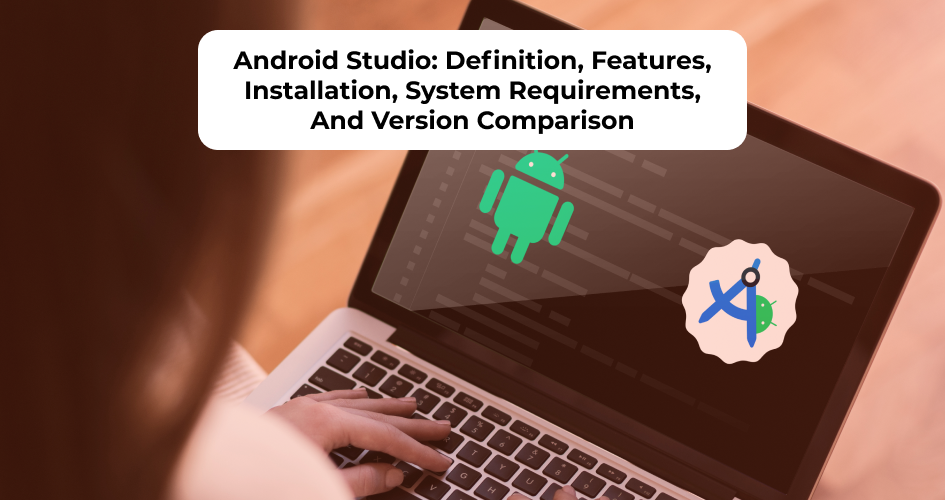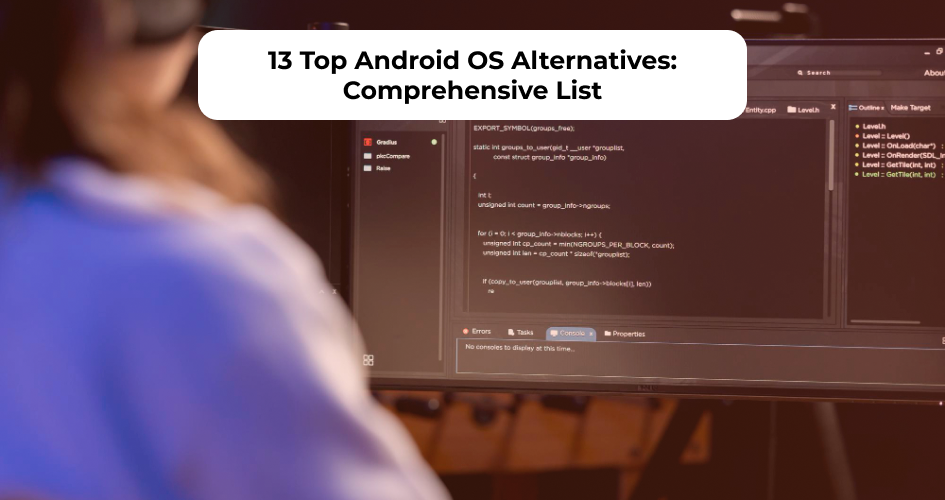Kotlin, a quite new programming language developed in 2010, is overtaking Java as many developers’ choice of language.
Its modern features and concise syntax are some reasons why Kotlin for Android app development has gained popularity.
Moreover, Google has made Kotlin its preferred language.
In this article, we’ll explore the reasons why Kotlin is gaining traction and some challenges if you decide to adopt Kotlin for your next Android app development projects.
Let’s dive in!
What Is Kotlin?
Kotlin is a modern, statically typed programming language running on the Java virtual machine (JVM) and is designed to interoperate with Java fully.
It was developed by JetBrains, the company behind popular Integrated development environments (IDEs) like IntelliJ IDEA.
In fact, more than 5.8 million developers and 95% of top Android apps have used Kotlin, making it one of the most widely used programming languages worldwide.
According to JetBrains, Kotlin’s customer satisfaction score is high, with 41.3% satisfied and 44.9% very satisfied.
How Developers Use Kotlin?
Kotlin’s primary function is for Android app development projects, but developers can also use this language for other purposes, including:
- Full-stack website development. An Android app development company using JavaScript can use Kotlin to translate Kotlin lines to JavaScript for front-end development. That way, they can use the same code for the front and back ends.
- Server-side development. Back-end web app developers usually use Java. However, they can leverage Kotlin alongside the existing language for server-side
- Cross-platform mobile development. Kotlin Multiplatform helps simplify cross-platform projects by reducing time spent writing the same code for different platforms, including iOS and desktop.
- Data science. Kotlin allows data scientists to make simplified code, build data pipelines, and integrate machine learning models into their production.
10 Reasons Why Kotlin Should Be in Your Next Project
Here’s why Kotlin isn’t just one of the trends in Android mobile app development, but the future of the operating system’s projects.
1. It’s Open-source
Kotlin is open-source, allowing a more collaborative nature to its development and maintenance.
Being open-source encourages contributions from developers worldwide, meaning bugs can be identified and fixed faster and new features can grow in a way that reflects users’ needs and preferences.
Developers from different backgrounds and perspectives can make tools and libraries more inclusive to the entire Kotlin community.
Furthermore, the open-source nature provides more transparency and builds trust among developers as the source code is available for anyone to inspect and modify.
It’s also more accessible to developers, specifically those working in smaller organizations or on personal projects.
They’ll be able to use and contribute to Kotlin development without having to pay licensing fees.
2. Concise, Expressive, and Easy to Read
Compared to Java, Kotlin approximately cuts 40% in the number of code lines, reducing verbosity, and removing unnecessary boilerplate.
That way, developers can focus on building innovative features rather than getting stuck by wordy code.
With clean syntax, Kotlin is easy to read and understand even for developers who are new to the language.
Its features like type inference and named parameters also make this programming language more readable.
The ease of readability is also applicable even when new developers learn the idioms, thanks to Kotlin’s features like extension functions, higher-order functions, and operator overloading.
3. Helps Increase Developer Productivity
With easy-to-read syntax and intuitive features like data classes, Kotlin enables developers to write code more efficiently, helping increase the developer productivity and speed up Android development projects as well as code maintenance.
This kind of efficiency and effectiveness make it an ideal choice for organizations looking to optimize their development processes and deliver high-quality Android solutions within budget and on schedule.
4. Has Improved Type Safety
Kotlin’s safety features help developers write more reliable code, reducing the probability of runtime errors and improving overall code quality.
One key safety feature of Kotlin is its null safety.
Kotlin’s type system distinguishes between nullable and non-nullable types, helping developers avoid Null Pointer Exceptions (NPE), which are a common source of bugs in many programming languages.
In fact, NPE is the number one cause of app crashes on Google Play.
Google then applied Kotlin on its product, Google Home, and reduced NPE crushes by 33% over a year.
The programming language simplified the code lines from 126 lines in Java to only 23 lines in Kotlin, which is an 80% reduction.
Although it’s not the only factor, more simplified code can contribute to increased safety.
With Kotlin, developers must indicate when a variable can hold a null value, reducing the risk of unexpected null references and making code more predictable.
5. Seamless Integration with Existing Java Code
Kotlin is compatible with the Java programming language, making sure your existing Java codebase can interact properly with Kotlin.
Developers can easily call Kotlin code from Java or vice versa to make the adoption process much easier and lower risk.
An alternative option is to use an automated Java-to-Kotlin converter named IntelliJ IDEA to even more simplify the migration of your existing Java code.
The tool can run Java applications, suggest code completion options, and detect errors.
You can download IntelliJ IDEA Ultimate to unlock all features.
It’s not free, but it has a free 30-day trial to get your hands on the app.
Try the IntelliJ IDEA Community Edition if you want to use the version that is completely free yet limited.
6. Extensive Features
Besides Null Safety and Java interoperability, Kotlin provides a list of helpful features to support your Android application development process, including:
- Standard library. Easily apply high-order functions with the help of idiomatic patterns and get query operations for collections and sequences.
- Functional programming. The programming language supports functional programming paradigms such as higher-order functions, lambdas, and immutability, making it easier to write concise and expressive code.
- Built-in support for coroutines. These are lightweight threads that allow for asynchronous and non-blocking programming, helping boost Android app performance and scalability in server-side applications.
- Data classes. These functions are developed to hold data and automatically generate additional member functions to make a more readable output while eliminating repetitive tasks and errors.
- Type inference. Determine variable types automatically based on context to help reduce the need for explicit type annotations.
- Smart casts. Automatically cast variables to more specific types within a conditional block, reducing the need for explicit type checks and casts.
- JavaScript transpilation. Select the JavaScript target, and the Kotlin code that is part of the project will be transpiled to JavaScript.
7. IDE Support
Android Integrated development environment (IDE) support can be one of the reasons why Kotlin is a preferred language for many developers.
IDE support on Kotlin can be a code assistance.
It helps developers write code faster by suggesting variable names, method signatures, and other elements as they type, improving productivity and reducing typing errors.
IDEs also offer syntax highlighting for Kotlin code that increases code readability.
Developers can visually identify different elements of the code, such as keywords, variables, and comments.
If you aim to reduce the debugging time, you will benefit from IDEs from its real-time error checking.
The tool will highlight syntax errors, typos, and other issues as they occur.
Having IDE support means you can also keep the code clean, organized, and maintainable with refactoring tools.
IDEs provide refactoring tools that allow developers to easily rename variables, extract methods, and perform other code refactoring operations with minimal effort.
8. Easy to Learn
This programming language gets inspired by existing ones like Java, C#, JavaScript, and Groovy to make sure that it’s easy to learn, so people can jump on board in a matter of days.
Kotlin benefits from extensive documentation, tutorials, and learning resources, including official documentation from JetBrains.
From getting a quick overview of the language with the basic syntax to learning to write idiomatic Kotlin code, you can check the materials for free on the Kotlin website.
You can also take a tour of Kotlin’s fundamentals and access the programming exercises.
After that, you can try it online and apply the knowledge.
Also, let’s not forget the active Kotlin community.
JetBrains provides multiple channels for more tips, news, and discussions including on Reddit and Slack.
You can also join its Discord to connect with other Kotlin users, contributors, and developers.
9. Supported by Google
Kotlin has been Google’s preferred language for Android software development.
The search engine giant even announced its official support for this language in 2017 and co-founded Kotlin Foundation to improve its performance.
Google mentions Kotlin has “best-in-class features” that can reduce common code errors and integrate into existing apps easily.
No wonder it commits to being Kotlin-first, meaning the company always designs its new Android development tools and content with Kotlin users in mind.
However, it still provides support for the Java programming language developers.
Today, more than 70 of Google’s apps are developed using Kotlin, including Maps, Drive, Home, and Play.
10. Diverse and Strong Portfolio
Hundreds of apps are already built with Kotlin, from startups to Fortune 500 companies.
Some companies that publicly state they use Kotlin include Duolingo, Netflix, Pinterest, and Uber.
Companies and organizations that have used Kotlin for backend development are:
- Amazon
- Atlassian
- Norwegian Tax Administration
- OLX
- Zald
Companies that have applied Kotlin for web development:
- Barclays Bank
- Fritz3
- Data2viz
One successful story comes from Headspace, one of the most popular meditation apps.
In 2019, the app decided to do an Android reboot. Its team wanted to create new prototypes with fresh designs.
Following Google’s journey, Headspace then fully migrated their app to Kotlin, helping the team increase the test coverage by around 15% to 80% with faster deployments, better quality code, and fewer crashes.
The result was also excellent.
The app got a 20% increase in paid subscribers and a 15% growth in monthly active users.
3 Possible Challenges When Adopting Kotlin
While Kotlin is an attractive language for beginners and experienced developers due to its numerous benefits, there are also some potential challenges that developers may encounter when adopting the language.
Learning Curve
Despite its ease of learning for many developers, transitioning to Kotlin may still need time and effort, particularly for teams with little prior experience with the language or who are accustomed to working mainly with other languages like Java.
Developers may need to invest time to take full advantage of Kotlin’s capabilities in training, self-study, or on-the-job learning to become proficient in this programming language.
Tooling and Ecosystem Maturity
Developers can use Kotlin’s strong tooling support, including integration with popular IDEs.
However, the ecosystem may not be as mature as that of more established languages like Java.
This could result in gaps in available libraries and third-party tools, which may need workarounds or custom solutions.
Adoption by Third-Party Libraries and Frameworks
While Kotlin’s adoption has been steadily increasing, not all third-party libraries, Android development frameworks, and tools may fully support or be optimized for this programming language.
Developers may experience compatibility issues, limited documentation, or reduced functionality when using Kotlin with certain libraries or frameworks.
Conclusion
Kotlin is a new programming language that has offered various benefits to users, not only Android app development but also full-stack website and multiplatform mobile development projects.
There are many reasons that this programming language is popular among developers.
Some of them are its conciseness, enhanced type safety, seamless integration with Java, and extensive features.
When selecting a technology stack for Android solutions, deciding whether to switch from Java to Kotlin will depend on several factors, including the project requirements, team expertise, and ecosystem support.
If you’re considering Kotlin for your project, partner with us for end-to-end development services or expert consultation.
Our experienced team specializes in Kotlin, ensuring smooth project execution from planning to deployment.
Whether you’re starting a new project or migrating to Kotlin, we deliver efficient, customized solutions aligned with your goals.
Let’s collaborate to bring your Android application features to life and achieve success together.





